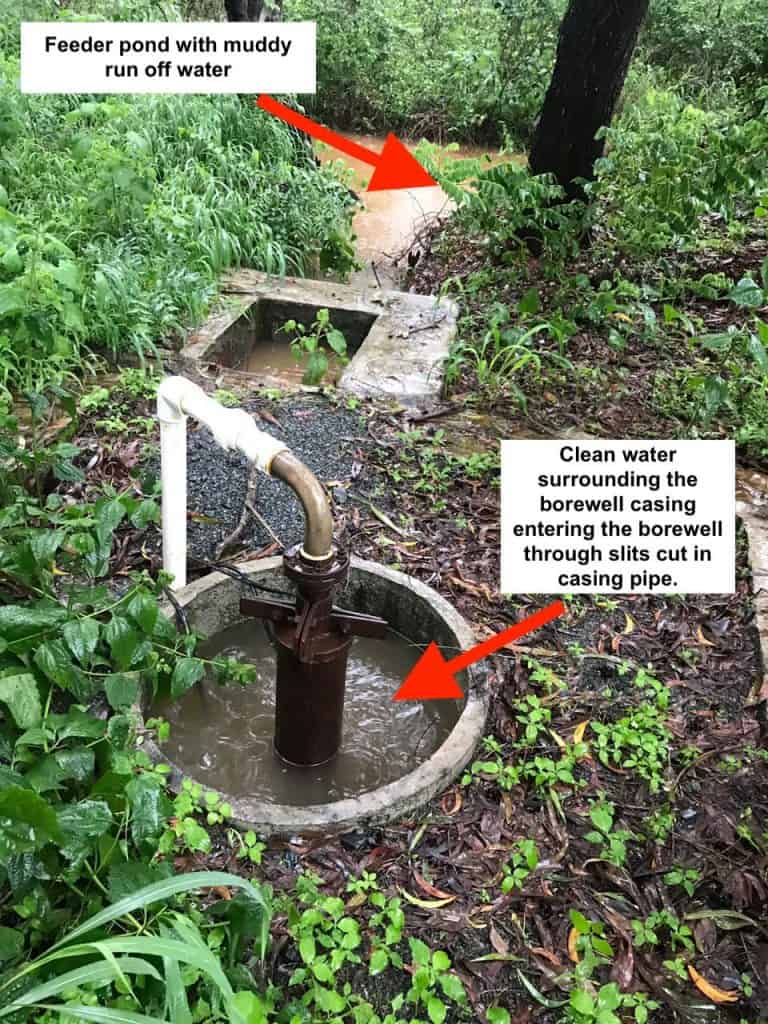People sometimes ask about the state of the water that is being put back down into the aquifer. Of course that is very important .. we do not want to contaminate the aquifer and nor do we want to send dirty muddy water back into the borewell as this will quickly silt up the borewell and make it unusable until it is power blasted free of silt again.
So we thought you would like to see this picture – which is clearly showing the quality of the water surrounding the borewell.. from here the water enters into the borewell casing through the nylon mesh through slits cut into the casing pipe. As you can see it is very clean water .. compared to the muddy brown state of the water in the feeder pond at the back of the picture. From there it passes through filtration materials and percolates up from the base of the pit created with cement rings placed around the borewell shaft.



Hello
This is Ashutosh Bhat, contacting you from Odisha. I work with a organisation called Gram Vikas. We are an NGO working in the space of Water and Sanitation for the past 40+ years.
Recently we had come across the work you have been doing, we were very impressed and happy to see the efforts/initiatives of your organisation around groundwater recharge and aquifer storage.
We intend to do a pilot for the same in Odisha. We have a few Borewell’s with reduced discharge/yield less than 0.5″, currently being used for drinking water.
Can we connect to take this further?
Please contact us on 9986840730.. we will be happy to discuss further.
sir i have 7 acre land and at Village Chadiyna , post zakhel TALUKA Sai, District Paten, Gujrarat , and having no borewell or well i want water for irrigation of my land and provide drinking water to surrounding farmer and their cattle please Gide me how to harvest water so that i can get sufficient water through out the year for all season cropping. my mobile no 8169982591
Please call me on 9986840730. We do not drill new bore wells but recharge existing wells.
Dear Madam, Sir
We like to promote the recharging of hand dug and drilled wells also in Africa and a few questions.
One of the objections of NGOs and government against recharging wells with surface water is the recontamination of water. How is that in you case? Is water used for drinking?
Do you know the quality of the water from recharged bore wells?
Do you promote the use of household water filters to make water safe to drink?
Regards
Henk Holtslag
SMART Centre Group
Thank you for your enquiry. There are a number of factors involved in your question. Yes we agree sometimes the risk of contamination of the underground water can be there… however our system has a filtration inbuilt to it..in the form of small stones, and nylon mesh – and gravel – although dissolved impurities can pass through this. But we have found that in fact most often, the recharged bore well produces a better quality water than prior to recharge. TDS are lessened, and toxins such as naturally occurring fluoride and arsenic are diluted – allowing the resulting water to be less toxic. Yes the water is used for drinking purposes. You might like to view this video – where the person is speaking about the taste of the recharged water compared to previously. https://youtu.be/PA1c6vEUjjY. Most of our recharge units are done on rural land – and the water is used for agriculture. We supply filtration units in the village for many households – a central point where people can access filtered water. But many people drink direct from these borewells that have been recharged. Consider this – if the ground water is totally depleted and a bore well is dry – there is NO water for irrigation or drinking – then the risk of contaminating the ground water through allowing rain water to filter back into it is a much less risk than having no water at all .. and having to abandon your farm. I hope this helps you and assists you in your enquiry into this work.
Pingback: 7 Rainwater Harvesting Ideas | Kolo Magazine